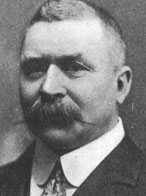John McKenna
 | |||
| Personal information | |||
|---|---|---|---|
| Date of birth | 3 January 1855 | ||
| Place of birth | County Monaghan, Ireland | ||
| Date of death | 22 March 1936 (aged 81) | ||
| Place of death | Walton, Liverpool | ||
| Teams managed | |||
| Years | Team | ||
| 1892–96 | Liverpool (with W. E. Barclay) | ||
John McKenna (3 January 1855 – 22 March 1936), was an Irish businessman, rugby player and the first manager of Liverpool Football Club. McKenna was born in the parish of Donagh, County Monaghan[1], to Patrick McKenna and Jane McCrudden, and moved to Liverpool in the 1870s in search of work.
Early career
McKenna found employment first as a grocer’s boy before working as a vaccinations officer for the West Derby Union, which was responsible for the upkeep of the Liverpool workhouses at the time. McKenna had a keen interest in sport, in particular rugby and shooting ; he helped in the forming of a regimental rugby club and became involved with the West Lancashire Rugby Union.
Liverpool F.C.
Through his religious beliefs and political opinions[citation needed] he met John Houlding, who invited him to Anfield to watch his Everton team in action. He remained with Houlding after Everton left Anfield for Goodison Park. 'Honest' John was a major driving forces for Liverpool throughout the early years,[citation needed] and he used his connections to fish for players in Glasgow. His team was known as the "Team of Macs" due to the number of players with "Mc" in their surname: Duncan McLean, James McBride, Malcolm McVean, Hugh McQueen, Matt McQueen, John McCartney, Bill McOwen and Joe McQue.
Acting as the club's secretary, McKenna telegraphed the Football League asking for Liverpool to be admitted to it, but was denied entry by the F.A.. This refusal forced McKenna to guide Liverpool through the ranks of the Lancashire League instead. Liverpool played their first game with an 8–0 win at Anfield against Higher Walton, with John Smith scoring the first competitive goal. After ending their first competitive season as champions, Liverpool were elected into the Football League, and played their first Football League match away to Middlesbrough Ironopolis on 2 September 1893, and won 2–0.
McKenna then served as Liverpool chairman from 1906 and 1915, and was then elected president of the Football League in 1917, a position which he held until his death in March 1936.[2]
Legacy
In August 2011, a commemorative plaque in honour of Liverpool FC's first manager John McKenna was unveiled in Glaslough in County Monaghan, Ireland. Over 200 Liverpool fans and interested observers attended an informative talk on McKenna by Keith Falkiner, author of the book Emerald Anfield, in the local community hall before the plaque was unveiled by Kopite and LFC Donegal secretary David Moen.
At the conclusion of his talk, Falkiner summed up the achievements of McKenna: "The course of history has proven John McKenna to be one of the most powerful and successful men at Liverpool Football Club - the third most important figure, in my opinion, after only Bill Shankly and the clubs founder John Houlding. The people of Monaghan should be proud of this history and proud of 'Honest' John McKenna - who is arguably the greatest Irishman who has ever been involved with the game of association football in Britain."[citation needed]
When unveiling the plaque Moen said: "It's a great honour for me personally to unveil this magnificent plaque. I have a lot of people to thank. The local community, the County Council, my family, friends and most of all, 'Honest' John McKenna. It gives me great pleasure to unveil this plaque in honour of Liverpool legend and Monaghan native 'Honest' John McKenna."
References
- ↑ Profile of John McKenna at lfchistory.net, accessed 27 September 2007.
- ↑ "22 March 1936 - The Passing Of A Liverpool Legend". www.thisdayinfootballhistory.blogspot.com. Retrieved 30 March 2013.
External links
| ||||||||
| |||||